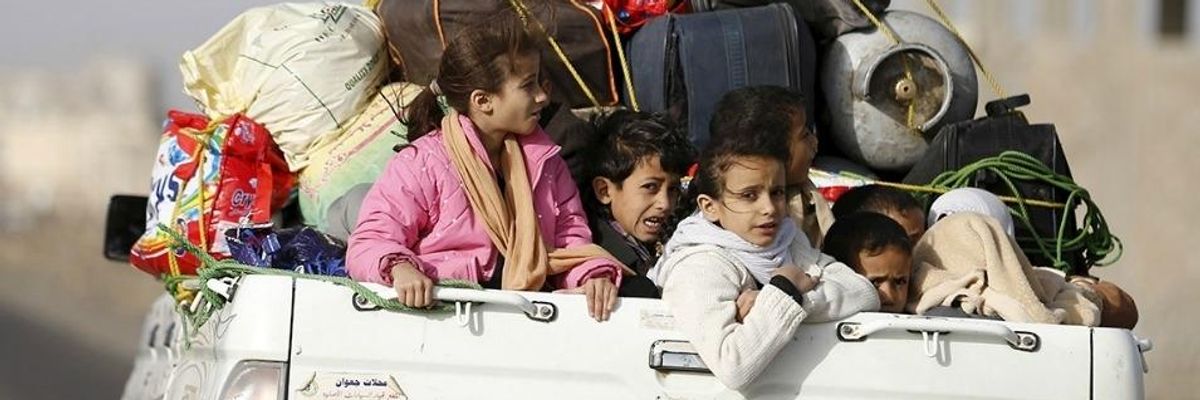Last week a royal Saudi charity announced that it would donate $244 million to help those in the grip of a humanitarian crisis in Yemen. But meanwhile, the ongoing blockade by the Saudi-led coalition combined with escalating violence risks pushing the country towards a famine.
The economic blockade, originally designed to stop Iranian supplies from reaching Houthi rebels, began in March 2015. It is backed by five of the six Gulf Cooperation Council member states--Oman being the only exception.
This Saudi-led coalition is also responsible for airstrikes against the population, backed by intelligence from the USA. The UK has expressed its support for the Saudi-led assault "in every practical way short of engaging in combat", as Philip Hammond, UK Foreign Secretary stated. In so doing, all parties involved in the airstrikes, including the US and UK, are tacitly supporting the economic blockade.
The blockade may have succeeded in stemming the flow of supplies to Houthi rebels but at an unacceptable cost to the civilian population. Keep in mind, Houthis represent at least a quarter of the Yemeni population; even if the blockade was more targeted, depriving a quarter of the population of essential goods like food--leading to starvation--is not only unreasonable, but also inhumane. In August 2015, the World Food Programme said Yemen was "one step away" from famine.
The blockade has hit Yemen hard for a number of reasons. It is a resource-scarce environment that heavily depends on imports for food and fuel. According to Oxfam, 90 percent of staple food items, such as wheat and rice are imported. Even before the current conflict broke out, more than ten million Yemenis faced hunger every day.
Humanitarian assistance can only do so much and whatever assistance is administered today will not feed the population forever as Yemen faces a severe economic crisis. Businesses and traders in Yemen are critical to bringing in food, medicine and more, but trade has nearly ground to a halt, and the escalation of violence is already placing restrictions on access.
As a consequence of the blockade and the conflict, the exchange rate is rising dramatically and it is increasingly difficult to exchange Yemeni riyals with dollars--which will likely lead to the collapse of the Central Bank of Yemen. The Central Bank has so far guaranteed the exchange rate for the import of wheat but if it collapses, traders will be exposed on all goods that they have not yet exchanged for Yemeni riyals.
Meanwhile humanitarian aid organisations are struggling to deliver aid. Most recently, a MSF hospital in the north of Yemen was bombed by a missile strike (Saudi Arabia has denied responsibility for the attack). The economic blockade is also restricting the flow of humanitarian assistance, particularly medicine, because they have relied on local businesses to bring in and distribute aid. And finally, getting aid in is no guarantee that it gets evenly distributed to the various regions, as aid groups are struggling to gain access.
The conflict, and resulting humanitarian crisis, can play out in a number of ways. Here, I outline three future scenarios--and what they mean for civilians in Yemen.
Scenario one
The blockade continues, foreign currency is depleted and businesses are no longer able to bring in imports into the country. The Saudi-led coalition continues to bombard Yemen but victory remains fleeting. The international community backs the Saudi-led coalition and the current Yemeni government, legitimising the airstrikes and the attacks.
This leads to large scale starvation, perhaps even famine. The number of refugees and internally displaced people increase. Al-Qaeda in the Arabian Peninsula (AQAP), and perhaps even the so-called Islamic State (IS), gets a better chance at recruiting youth who have no other options for survive, with spill-over effects in Saudi Arabia and beyond.
Scenario two
International pressure on the Saudi coalition lifts the blockade. Businesses in Yemen slowly start functioning again. Limited imports are brought in due to the security situation. Humanitarian assistance flows more smoothly, especially medicines. The number of refugees fleeing the country decreases.
As a result, Yemenis are still in a crisis but not starving. There are less desperate youth at risk of exposure to AQAP and IS. The Saudi-led coalition realises that an absolute victory is unlikely and is incentivised to negotiate. The humanitarian crisis in Yemen remains but is much more manageable.
Scenario three
The blockade is lifted and support for Yemen's economy allows businesses to function at normal capacity. Oman, having maintained a degree of neutrality thus far, manages to broker a political solution between Saudi Arabia and the Houthis, with a return to the outcomes of the National Dialogue and the draft constitution. The Gulf compiles an economic recovery plan for Yemen. This will limit Yemen's humanitarian crisis and security threats.
We are currently on track for the first scenario to become the reality. The limited amount of humanitarian aid that is reaching civilians is crucial and necessary, but not enough. If the international community pressures the coalition to lift the blockade, allowing Yemeni businesses to function, people will have a chance at survival.
Yemeni civilians are starving as the international community tacitly allows the blockade to continue.

